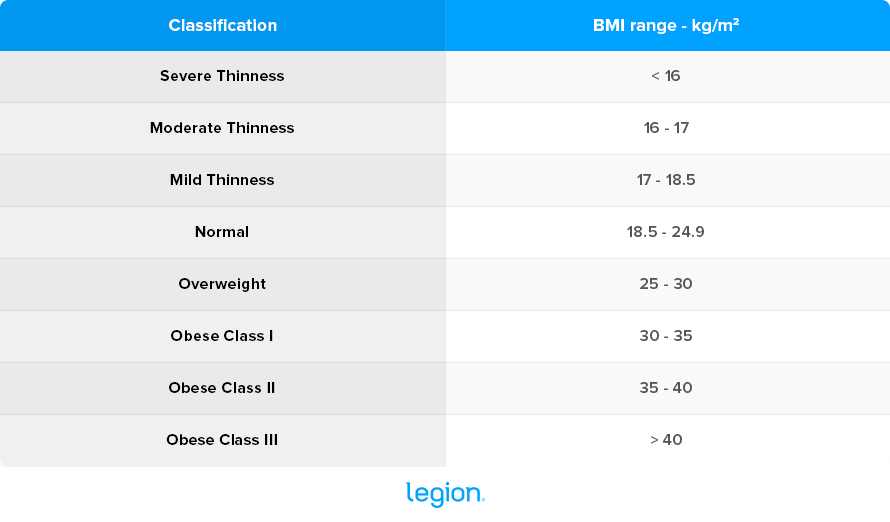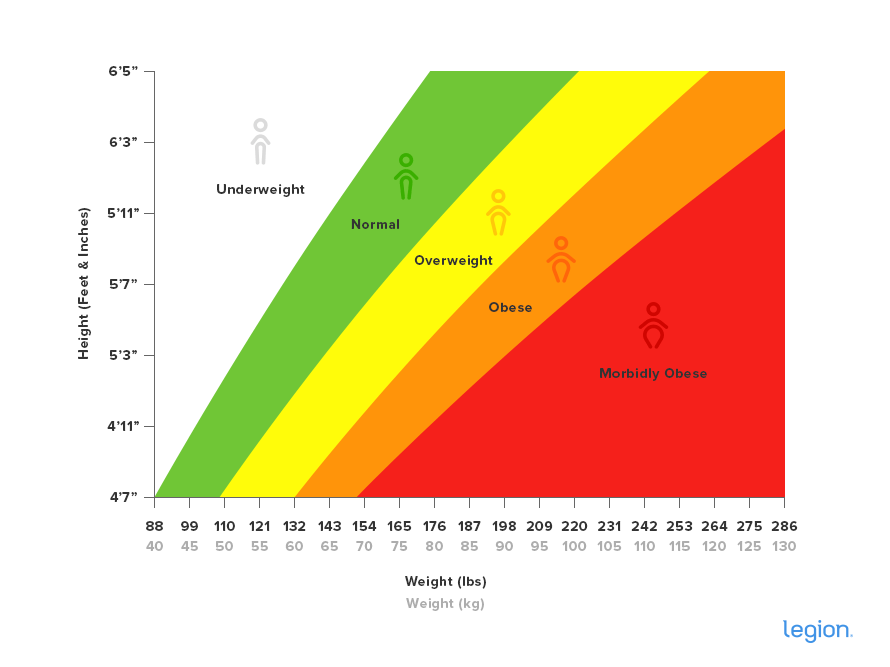Use the Legion Adult BMI Calculator to calculate your body mass index (BMI). Enter your preferred unit of measurement, height, and weight, and the calculator will indicate whether you’re a healthy weight for your height.
What Is BMI?
Body mass index (BMI) is a numeric expression of the relationship between height and weight.
Doctors, personal trainers, and other healthcare professionals commonly use BMI to determine if someone is over, under, or average weight.
Although not as accurate or useful as your body fat percentage or body composition, BMI gives you a general idea of whether a person’s weight will increase their chances of suffering a range of health conditions.
A healthy BMI is 18.5 to 24.9. Below this is considered a low BMI, and above it is a high BMI.
BMI Ranges for Men and Women
Here are the World Health Organization’s (WHO) recommended body weight guidelines based on BMI values, detailing specific BMI ranges for men and BMI ranges for women aged 20 and above.

BMI Chart
A BMI chart is a table or graphic that helps you find which weight category you belong to based on your BMI.
They compliment the Adult BMI Calculator by helping you find which weight category you belong to based on your BMI.

The Risks of Being Overweight
Being significantly above the “normal” BMI ranges for men and BMI ranges for women puts you at a significantly higher risk of health problems.
Research shows that having a high body fat percentage increases your risk of developing conditions like heart disease, hypertension, type 2 diabetes, certain cancers, and stroke.
Moreover, maintaining a healthy weight can enhance your mental health. Obesity and depression often go hand in hand, with the emotional stress of being overweight potentially resulting in low self-esteem and anxiety.
The Risks of Being Underweight
Being significantly below the “normal” BMI ranges for men and BMI ranges for women can be just as detrimental to health as being overweight, though it presents a set of risk factors distinct from those associated with obesity.
These can include weakened immune function, a higher susceptibility to infections, decreased muscle mass and strength, and fertility issues.
Certain body types are naturally leaner, but when weight drops below a healthy range (a BMI of 18.5 to 24.9) for one’s body structure, these risks become more prevalent.
Additionally, being significantly underweight may indicate underlying health problems, such as thyroid, digestive, or eating disorders. Understanding the difference between a naturally lean body type and being unhealthily underweight is crucial for maintaining optimal well-being.
Are BMI charts accurate for muscular men?
Adult BMI calculators often classify muscular, lean people as “overweight” because they only account for total body weight and not body composition.
Thus, if you know you’re fairly lean (less than 15% body fat for men or 25% body fat for women), don’t worry if you’re “overweight” according to an adult BMI calculator—research shows this isn’t unhealthy.
That said, if a BMI chart classifies someone as “obese,” there’s virtually no chance this is due to naturally high levels of muscle mass. Either the person is carrying more body fat than they realize, or they’re taking steroids.
BMI Formula
Calculating your body mass index is simple—you just need to know your height and weight.
The formula is BMI = kg/m2, where “kg” is the person’s weight in kilograms and “m2” is their height in meters squared.
You can calculate your BMI using this formula, or use the Legion Adult BMI Calculator to arrive at the same answer (in less time).
FAQ #1: What is the correct BMI for my age?
Your ideal weight doesn’t change as you get older. Although many people do gain weight as they get older, this is not necessarily “natural” or healthy. Instead, it’s typically due to a lack of activity and excessive intake of calories, which cause slow, steady weight gain over time.
That said, gaining a small amount of weight in old age isn’t necessarily unhealthy either, so long as you’re still roughly within a healthy BMI range of around 18.5 to 24.9 (or slightly higher, if you have a lot of muscle mass).
A good way to ensure you fall within this range is to regularly check your BMI using an adult BMI calculator like the one above.
FAQ #2: What is a healthy BMI range for women?
A healthy BMI range for women is generally between 18.5 and 24.9. That said, if a woman is leaner and has more muscle mass than average, it’s possible to be perfectly healthy despite having a BMI over 24.9. It’s rare to find a woman who is healthy with a BMI of less than ~17, though.
FAQ #3: Are BMI calculators accurate for “big-boned” people?
Yes.
Although some people do have thicker, denser bones than others (thanks to resistance training and genetics), the differences are too small to meaningfully impact your BMI.
Scientific References +
- Keramat, Syed Afroz, et al. “Obesity and the Risk of Developing Chronic Diseases in Middle-Aged and Older Adults: Findings from an Australian Longitudinal Population Survey, 2009–2017.” PLoS ONE, vol. 16, no. 11, 16 Nov. 2021, p. e0260158, www.ncbi.nlm.nih.gov/pmc/articles/PMC8594821/, https://doi.org/10.1371/journal.pone.0260158.
- Lavallee, Kristen L., et al. “Obesity and Mental Health: A Longitudinal, Cross-Cultural Examination in Germany and China.” Frontiers in Psychology, vol. 12, 21 Sept. 2021, https://doi.org/10.3389/fpsyg.2021.712567.
- Goonasegaran, Arvin Raj, et al. “Comparison of the Effectiveness of Body Mass Index and Body Fat Percentage in Defining Body Composition.” Singapore Medical Journal, vol. 53, no. 6, 1 June 2012, pp. 403–408, pubmed.ncbi.nlm.nih.gov/22711041/.
- LAYNE, JENNIFER E., and MIRIAM E. NELSON. “The Effects of Progressive Resistance Training on Bone Density: A Review.” Medicine & Science in Sports & Exercise, vol. 31, no. 1, Jan. 1999, pp. 25–30, europepmc.org/abstract/med/9927006/reload=0, https://doi.org/10.1097/00005768-199901000-00006.










